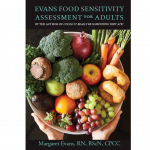
Order the Assessment!
Evans Food Sensitivity Assessment for Adults

FINDING REST FROM EMOTIONAL EXHAUSTION
COMPASSION FATIGUE is the name given to a collection of behaviours and symptoms that appear when we offer empathy and caring to someone we love for a prolonged period of time without adequate support. Our normal sense of kindness and compassion begins to fade and resentment and overwhelming fatigue begin to grow. Where we would normally step up to support the needs of our care partner, we find ourselves being disinterested and detached. We struggle to make even the smallest decisions and our physical health begins to deteriorate. Despite our best intentions, our energy simply drains away and we find it increasingly difficult to continue offering ongoing support. We long for time alone, something different to do, a change in routine and a chance to simply get a break from caring so much.
Compassion fatigue is very different from traditional “burnout” which many people experience when they work too many hours with too little time off. Compassion fatigue is the result of caring so much that we become emotionally depleted. Such things as a vacation which would normally be a welcome change, do not offer adequate support if we worry the entire time we are away. We need regular breaks from our situation AND FROM THE STRESS THAT ACCOMPANIES IT.
Whether we are physically caring for someone or simply sharing their Parkinson’s journey in other ways, we can still experience the emotional exhaustion of compassion fatigue. So often caregivers are told, “Take time for yourself” and they simply dismiss the advice as they are sure the person offering the suggestion really doesn’t understand how difficult that is to do. If you go shopping with a friend and your mind is still preoccupied with thoughts of your care partner, the shopping trip offers very little break from your struggle. If you have to wedge the shopping trip into an already overscheduled life, the enjoyment and the rest can be completely lost. The secret is to find creative and healthy ways to get true support; the kind of support that allows you to put down the worry and permits your mind, your heart, and your soul to rest. This requires carefully chosen activities of self care as well as adequate space and support in your life to address the emotional exhaustion you are experiencing.
Consider some of the suggestions offered below and be creative in finding solutions of your own.
If you nurture yourself at the same time as you offer empathy and caring to your care partner, you will be able to continue your supportive relationship for the long haul. Don’t hesitate to ask for the help that you need – it is not a sign of weakness nor an inability to cope – it is a sign of strength and recognition that you, too, deserve empathy and rest.
Further Reading
« I Love My Husband But I’m Exhausted / What Makes You Feel Loved and Appreciated? »